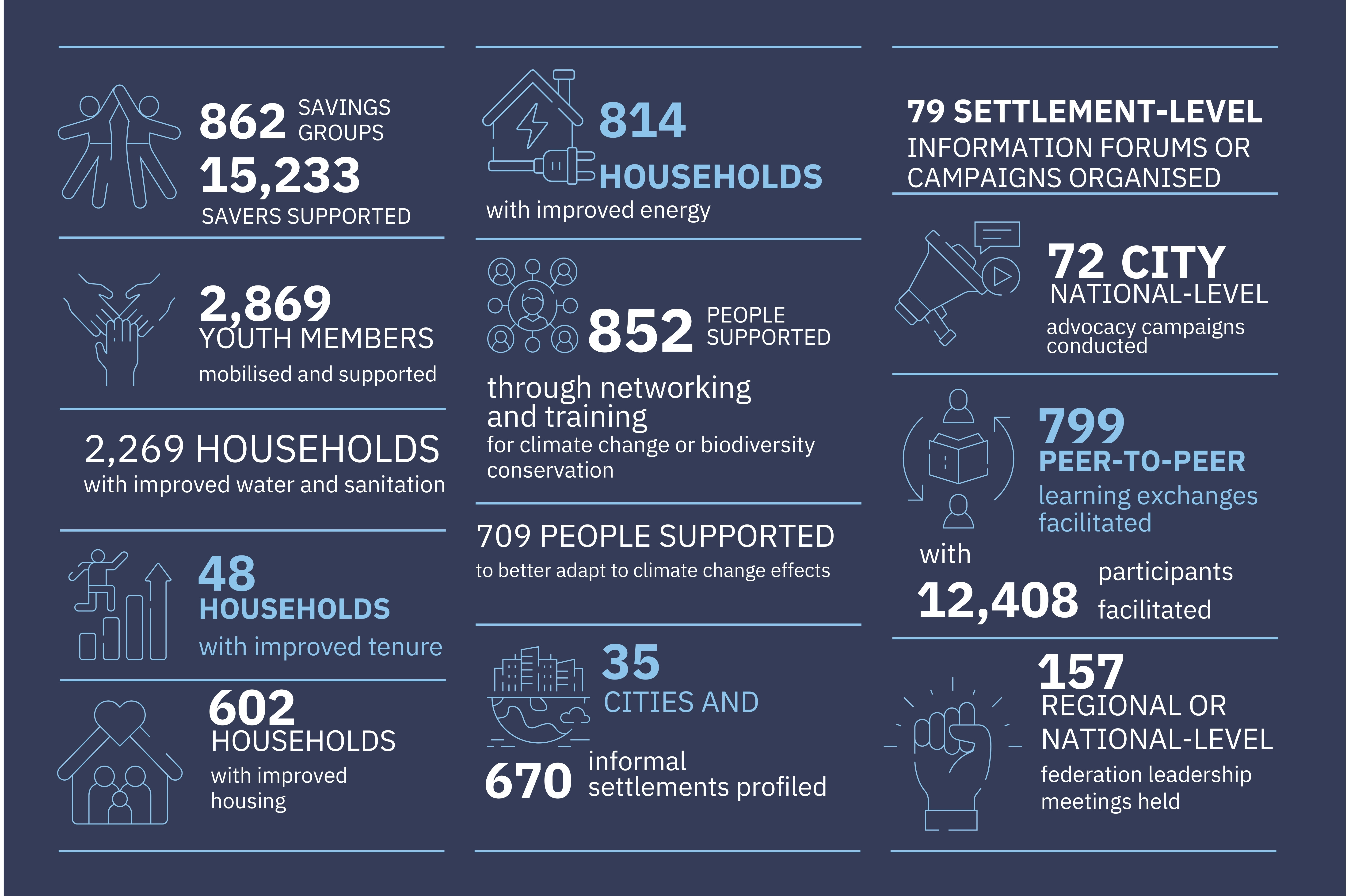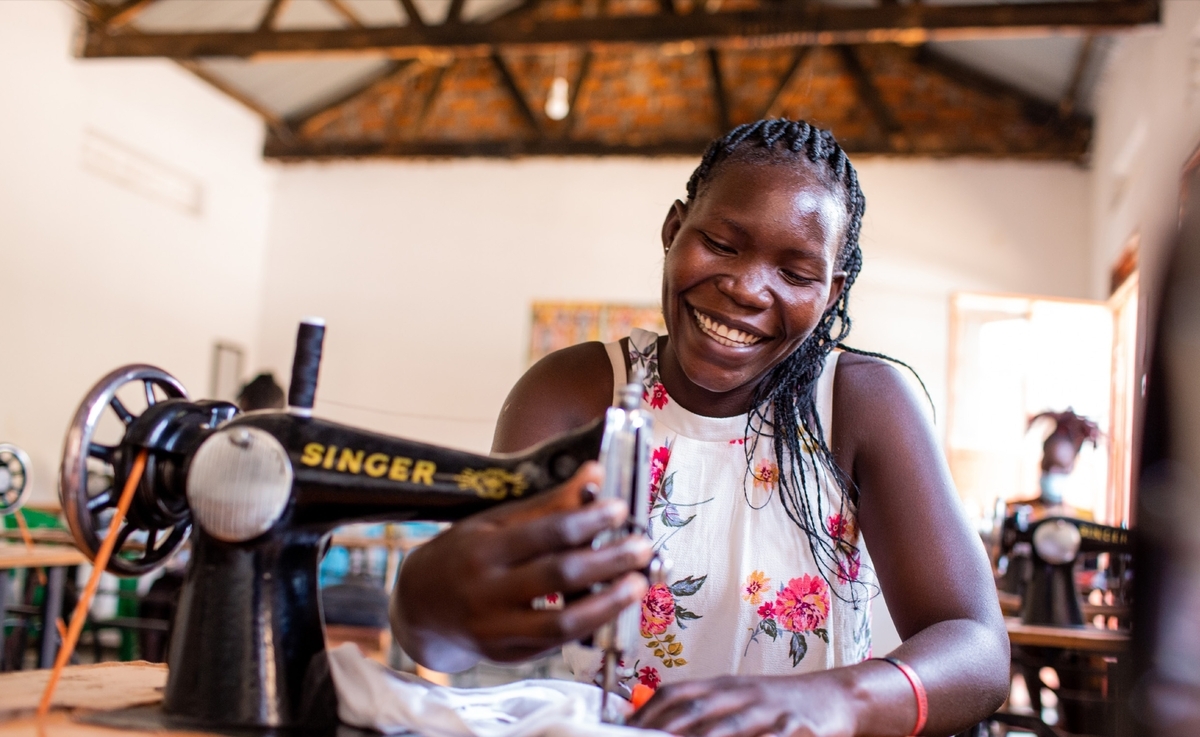Phase I Results (2020-2021)
The programme supported civil society groups to respond to the immediate social, economic, and health impacts of the Covid-19 pandemic in informal settlements. It emphasised the real and urgent needs of their communities and the development of more robust partnerships for inclusive city planning.
Many residents in slums live in overcrowded homes without access to on-site water or sanitation and face the constant threat of forced eviction. Preventative measures against Covid-19, such as hand washing, disinfecting, physical distancing, and quarantine, were often impossible for the urban poor.
- In Ghana, the federation identified and mapped Covid-19 hotspots, where community members were trained to manufacture and install hand washing stations. Additionally, the federation installed in-yard water connections to vulnerable households in informal settlements.
- In Zambia, the federation supported provisional WASH (water, sanitation and hygiene) interventions in public places. It also set precedents for water provision to slum communities through community-led processes. The Zambia Alliance identified 75 vulnerable women who were at greater risk when collecting water from congested public taps. Additionally, the federation lobbied for pro-poor water subsidies in engagement meetings with water trusts and utility companies.
Despite the negative impact of Covid-19, the response to it has also created opportunities. For example, income-generating projects have equipped community members with skills that can be used to earn a living.
- Federation members in Malawi, Zambia, and Zimbabwe were trained in sewing reusable face masks and producing liquid soap and sanitisers.
- In Malawi, federation women and youth with design and tailoring skills produced and distributed 17,300 reusable face masks to vulnerable members of the community and primary school children.
- In Namibia, the Philippines, and Sierra Leone federations’ members were trained in permaculture and supported to establish urban community gardens.
SDI affiliates adapted profiling and mapping tools of the Know Your City workstream to gather data on the impacts of Covid-19.
- In the Philippines, the federation mapped the vulnerability of 22 communities and produced localised Covid-19 hotspot maps. These included the identification of households with vulnerable groups such as seniors, children, persons with disabilities, and pregnant women.
- In Botswana, the federation gathered information from 33 savings groups on the pandemic’s impact on their livelihoods and savings. Many members stopped saving due to unemployment. Most of the small businesses collapsed and informal workers were not able to work due to lockdowns. This left many without jobs and the ability to feed their family.
- In Zimbabwe, youth were trained on data collection tools to gather information about awareness and community preparedness for Covid-19. They also explored the pandemic’s impact on livelihoods, housing, and WASH.
- The Sierra Leone SDI Alliance, in consultation with Freetown City Council (FCC), developed a mobile app (FISCOVIDATA) and live dashboard to identify hotspots and to link to government service providers in real-time. It relays information to authorities and notifies communities of actions taken. The app has been piloted in 10 slums. Sierra Leone Urban Research Centre (SLURC) and the College of Medicine and Allied Health Sciences (COMAHS) are interested in developing it further, to be used in future health emergencies.
The programme supported communities to highlight their plight and to push for meaningful change in addressing basic services, health needs, and decent shelter.
- SDI affiliates in Brazil and Malawi improved the tenure security of informal dwellers. In São Paulo, Brazil, they trained federation leaders on issues of land regularisation. A new network will continue dialogue with local governments on the security of tenure.
- In Malawi, Blantyre and Lilongwe communities improved their tenure security by obtaining title deeds for individual plots. Additionally, the federation has advocated for reducing regularisation charges by more than 50% and allowing plot owners to pay in instalments.
- In South Africa, the SA SDI Alliance has highlighted the lack of access to basic services. The Alliance is preparing to sign an official MoU with the Madibeng municipality. This will bind the municipality to a partnership with the Federation in terms of addressing informal settlement upgrading, delivering housing, and formalising structures.
Phase II Results (2022-2024)
The programme supported communities’ sustainable and inclusive recovery from the Covid-19 pandemic. It focused on rebuilding efforts identified and prioritised by slum dweller federations, as well as support for local adaptation to climate change.
Activities focused on assessing and improving infrastructure in informal settlements.
- In Ghana, the affiliate rehabilitated communal toilet facilities in two areas.
- In India, the affiliate implemented 14 health camps in 3 cities and follow-up letters have been sent to Assistant Municipal Commissioners to resolve certain issues before the monsoon season, such as public toilets, drainage channels, open as well as choked drains, problems of drinking water, roads and street lights, daily garbage collection, provision of waste collection bins, and drainage systems.
- In Liberia, the affiliate supported the maintenance of 50 public toilets and water facilities, as well as implemented an integrated solid waste management training with the city on proper waste collection and disposal practices.
- In Malawi, the project has supported 13 private waste operators to progress with their formal registration.
- In Namibia, 30 meetings were held with authorities and stakeholders to facilitate the production of 33 technical drawings for water/sewage reticulation plans.
- In Zambia, the affiliate purchased 20 water tanks to be placed in public spaces.
Savings groups are the bedrock of SDI federations, enabling urban poor dwellers to organise, improve livelihoods, and engage city authorities in inclusive development. Training events like workshops, peer-learning exchanges, and educational visits enhanced federation members' capacity and leadership. Topics covered gender mainstreaming, resource management, digital skills, and leadership development.
- In Brazil, the affiliate conducted trainings and exchanges for federation leadership and youth on citizenship, climate, and environmental education.
- In Kenya, the affiliate organised an advocacy forum to mobilise communities to champion the adoption of Mathare as a SPA with a focus on climate adaptation. Attendees developed an advocacy agenda and designed a ward-based community engagement strategy.
- In Liberia, the affiliate conducted civic engagement workshops in promotion of nonviolent elections through the use of clean speech and avoidance of hate messages.
- In the Philippines, meetings were held with various local government units through work to promote grassroots research and community-centred services and projects to address a range of urban poor issues.
This entailed establishing and strengthening partnerships with local and national authorities, NGOs, and other stakeholders to support inclusive development initiatives.
- In Kenya, collaboration with the government for the Mathare and Mukuru Special Planning Areas was expanded.
- In Malawi, 61 households in Lilongwe were granted ownership titles, as part of ongoing efforts to regularise informal settlements.
- In Senegal, the affiliate conducted a seminar with the Ministry of Housing to share experiences on housing as a fundamental right in association with the 100,000 housing programme.
- In Uganda, the affiliates conducted settlement and municipal forums while MOUs were pursued with urban authorities in all 11 regions.
Activities focused on conducting surveys, assessments, and research studies to gather data on various aspects affecting informal settlements.
- In Ghana, a baseline study was conducted in 3 settlements on air pollution and based on that, the affiliate organised education and sensitization of youth on the negative impacts of air pollution.
- In Kenya, a vulnerability mapping exercise identified groups along the Mathare and Gitathuru rivers, facilitating collaboration among 46 groups working to reclaim the Mathare River. The Kenya affiliate also mapped and numbered all structures in the Mukuru Riparian Reserve and launched the Mukuru Riparian Reserve Plan.
- In the Philippines, a comprehensive risk profile was undertaken, highlighting Covid-19 and other vulnerabilities of informal dwellers.
- In Senegal, rapid assessments of the neighbourhood environment (waste management, liquid sanitation, and energy) were conducted, and fact sheets were produced for circulation of data to local and national authorities.
- In Sierra Leone, climate change impact assessment and risk mapping were conducted in 12 settlements.
Programme Results



















